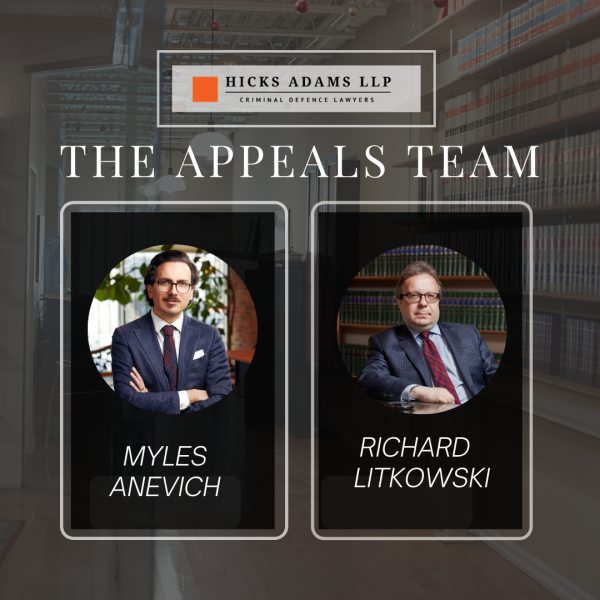Hicks Adams is a unique fixture among criminal law firms in Toronto in that we offer a full appeals group in addition to regular criminal defence work. Criminal appeals are notoriously labour-intensive and time consuming, requiring inordinate research and a comprehensive understanding of complex legal principles and judicial precedent. It’s no wonder that most law firms, already busy with criminal trials, don’t have the bandwidth to manage these complex cases in-house and often refer them out to other firms.
Our criminal appeals department is led by Richard Litkowski, a veteran criminal lawyer with thirty years of experience in the field. Richard began his legal career by serving as clerk to Chief Justice Antonio Lamer of the Supreme Court of Canada. The department’s newest lawyer, Myles Anevich, was aware of Richard’s sterling reputation and record of success and in fact sought out the opportunity to work at Hicks Adams in part to have the opportunity to work with Richard. Before joining the firm, Myles gained appeals experience working on a high-profile appeal concerning the constitutionality of mandatory registration on the National Sex Offender Registry for individuals who had been found not criminally responsible for their actions.

Hicks Adams Offers Vertical Integration for Criminal Defence Clients
Both Richard and Myles focus nearly exclusively on appeal matters and often work in conjunction with the other criminal defence lawyers at the firm on matters that the firm has managed from the beginning. This vertical integration enables a client to stay with the firm from their initial bail hearing through to their appeal if necessary. This means they can remain with a firm they have come to know and trust to see their matter through to its conclusion, an incredible relief when facing one of the most impactful events that can happen in a person’s life.
This integration benefits clients in other areas as well. Because many cases are managed within the firm from the start, this simplifies consultations and the sharing of information between the trial lawyer and the appeal lawyer. Teams can work together to share data and strategize, and this gives the appeal lawyers the benefit of unique insights into the case they may not otherwise have access to. These benefits go both ways. Trial lawyers at the firm who anticipate that a matter may go to appeal often work in conjunction with our appeals group to strategize and plan for a potential appeal as part of their trial work. When the groundwork is laid at trial through submissions, this often makes for a more successful appeal later on. Richard Litkowski is also in demand for consultations with other criminal lawyers. He is routinely sought out for his insights by lawyers throughout Canada working on criminal matters at both the trial and appeal level.
An Academic Approach to the Law
Appeal work is a much more academic task than a criminal trial. Much of the work of a trial occurs in the courtroom (or over Zoom, in the current climate), with carefully constructed arguments and presentations of evidence. In an appeal, 90% of the work is completed in advance of the actual hearing. The bulk of the work involves painstaking research and the application of high-level and complex legal concepts to the facts of the case at hand. Both Richard and Myles enjoy this aspect of appeal work, both citing a particular interest in legal research and the history of criminal jurisprudence.
In a trial, a lawyer is focused on the facts and evidence of the case, whereas in an appeal, the focus shifts to a methodical investigation of the principles applied in trial and identifying potential errors. As Myles is fond of saying, at trial, the lawyer’s role is to be the painter, arranging facts and evidence and testimony to construct a version of the events. In an appeal, the lawyer acts as the critic, examining the painting created at trial by the lawyers and the judge, and deconstructing it to identify weaknesses or errors.
The Greatest Reward of Criminal Appeal Work
An appeal can sometimes involve as many as 400 hours for a lawyer on a single case. Much of that time is spent researching and writing arguments, instead of in meetings with the client or in a courtroom. Despite all of the work, however, it’s the clients that really matter in the end. An appeal is focused on conceptual arguments and minute details, but once all is said and done, there is a real live human being with a future at stake, and that is what drives our team above all else. Richard cites his work with the Pro Bono Inmate Appeal Program (PIAP) as some of the most rewarding work of his career.
PIAP was started in 1999 when the creators noted that many serious appeal cases were being argued by inmates themselves. With few resources on hand to retain a lawyer, inmates were attempting to manage their own appeal without a legal background and with little understanding of the complex principles involved. Richard was one of the first lawyers to join the organization soon after it launched and continues to work with them to this day, working with inmates who would otherwise not have access to skilled representation.
For Unparalleled Representation in Criminal Appeal Matters, Contact Hicks Adams in Toronto
The criminal defence lawyers at Hicks Adams advise clients on how best to protect their rights and defend them in court. We defend individuals charged with a variety of offences, including violent offences, drug offences, weapons offences, fraud and homicides. If you are facing an appeal, our in-house appeals team will review your case and advise you of the best path forward for a successful appeal. Contact Hicks Adams in downtown Toronto to discuss the options available to help you through this time. Call us at 416-975-1700 or contact us online to schedule a confidential consultation.


